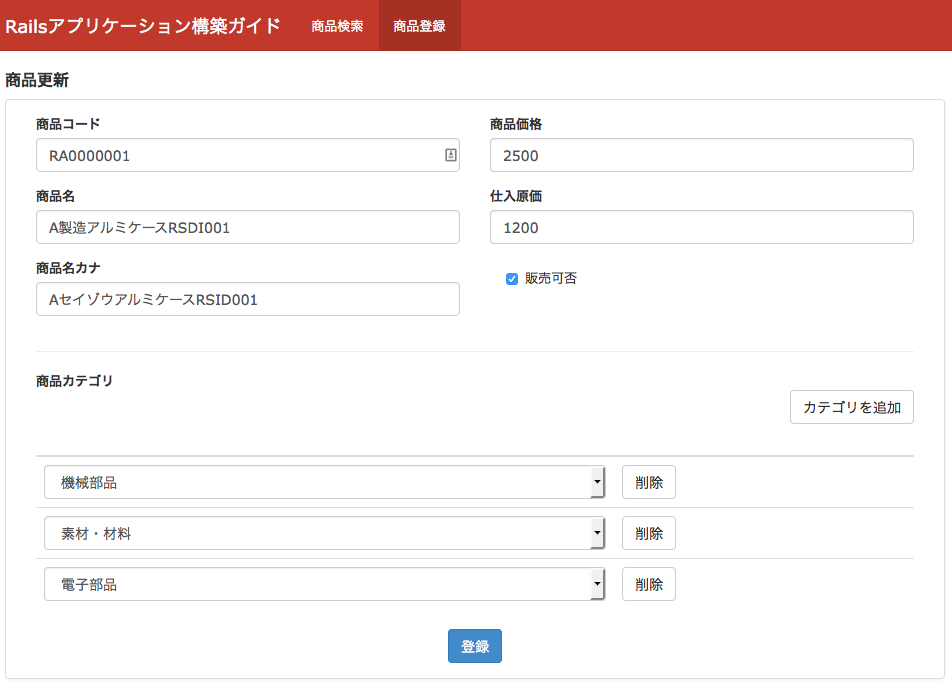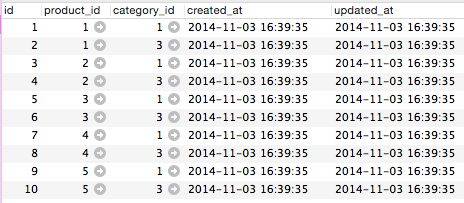1.4. 多対多の関連を持つオブジェクトを編集可能なフォーム¶
1.4.1. 課題: 商品登録画面の実装¶
多対多の関連を持つオブジェクトの編集画面について、 販売管理システムの商品登録画面を例に考えてみます。
商品登録画面では、商品に関する基本情報と商品カテゴリを登録可能です。 画面のイメージは下図の通りです。
商品にはカテゴリ情報を付与することができます。 カテゴリを追加ボタンを押すことで、商品に関連するカテゴリをいくつでも設定可能です。 また、不要なカテゴリは削除ボタンを押すことで削除可能です。
システムはproducts(商品)テーブルと、categories(カテゴリ)テーブル、 product_categories(商品カテゴリ)テーブルを持ちます。 商品とカテゴリは多対多の関連にあり、中間テーブルとして商品カテゴリテーブルを持ちます。
DB設計は以下の通りです。
Productモデルは以下の通りです。
# == Schema Information
#
# Table name: products # 商品
#
# id :integer not null, primary key
# code :string(10) not null # 商品コード
# name :string(50) not null # 商品名
# name_kana :string(50) default(""), not null # 商品名カナ
# price :integer not null # 商品価格
# purchase_cost :integer not null # 仕入原価
# availability :boolean not null # 販売可能フラグ
# created_at :datetime not null
# updated_at :datetime not null
#
class Product < ActiveRecord::Base
has_many :product_categories
has_many :categories, through: :product_categories
accepts_nested_attributes_for :product_categories, allow_destroy: true
validates :code, presence: true, length: { maximum: 10 }
validates :name, presence: true, length: { maximum: 50 }
validates :name_kana, kana: true, length: { maximum: 50 }
validates :price,
presence: true,
numericality: { only_integer: true, greater_than_or_equal_to: 0 }
validates :purchase_cost,
presence: true,
numericality: { only_integer: true, greater_than_or_equal_to: 0 }
validates :availability, inclusion: { in: [true, false] }
end
Categoryモデルは以下の通りです。
# == Schema Information
#
# Table name: categories # カテゴリ
#
# id :integer not null, primary key
# name :string(50) not null # カテゴリ名
# created_at :datetime not null
# updated_at :datetime not null
#
class Category < ActiveRecord::Base
has_many :product_categories
has_many :products, through: :product_categories
end
ProductCategoryモデルは以下の通りです。
# == Schema Information
#
# Table name: product_categories # 商品カテゴリ
#
# id :integer not null, primary key
# product_id :integer not null # 商品ID
# category_id :integer not null # カテゴリID
# created_at :datetime not null
# updated_at :datetime not null
#
class ProductCategory < ActiveRecord::Base
belongs_to :product
belongs_to :category
end
商品、カテゴリ、商品カテゴリのデータサンプルは、以下の通りです。
システム要件は以下の通りです。
- 商品登録画面では、以下情報が登録可能なこと
- 以下商品情報が登録可能なこと
- コード、商品名、商品名カナ、商品価格、仕入原価、販売可否フラグ
- 商品に紐づくカテゴリが登録可能なこと
- カテゴリはカテゴリテーブル内にあるデータのみ登録可能なこと
- カテゴリは複数登録可能なこと
- 商品、商品カテゴリの編集が可能なこと
- 商品に紐づく紐づくカテゴリは編集画面で削除できること
- 以下商品情報が登録可能なこと
1.4.2. 多対多の関連を持つ商品登録画面の実装方法¶
多対多の関連を持つオブジェクトを編集できるフォームの実装も、 1対多の関連を持つオブジェクトを編集可能なフォーム とほとんど変わりません。
以下、商品と商品カテゴリのフォームオブジェクトを作成します。
# app/models/form/product.rb
class Form::Product < Product
REGISTRABLE_ATTRIBUTES = %i(code name name_kana price purchase_cost availability)
has_many :product_categories, class_name: 'Form::ProductCategory'
end
# app/models/form/product_category.rb
class Form::ProductCategory < ProductCategory
REGISTRABLE_ATTRIBUTES = %i(id product_id category_id _destroy)
def selectable_categories
Category.all
end
end
コントローラの実装は以下の通りです。
# app/controllers/products_controller.rb
class ProductsController < ApplicationController
def new
@product = Form::Product.new
end
def edit
@product = Form::Product.find(params[:id])
end
def create
@product = Form::Product.new(product_params)
if @product.save
redirect_to products_path, notice: "商品 #{@product.name} を登録しました。"
else
render :new
end
end
def update
@product = Form::Product.find(params[:id])
if @product.update_attributes(product_params)
redirect_to products_path, notice: "商品 #{@product.name} を更新しました。"
else
render :edit
end
end
private
def product_params
params
.require(:form_product)
.permit(
Form::Product::REGISTRABLE_ATTRIBUTES +
[product_categories_attributes: Form::ProductCategory::REGISTRABLE_ATTRIBUTES]
)
end
end
Viewの実装は以下の通りです。
# app/views/products/new.html.erb (一部抜粋)
# edit.html.erb もpath以外は同じ
<%= form_for(@product, url: path, method: method) do |f| %>
<div class="col-sm-6">
<div class="form-group">
<label class="control-label" for="">商品コード</label>
<%= f.text_field :code, class: 'form-control' %>
</div>
<div class="form-group">
<label class="control-label" for="">商品名</label>
<%= f.text_field :name, class: 'form-control' %>
</div>
<div class="form-group">
<label class="control-label" for="">商品名カナ</label>
<%= f.text_field :name_kana, class: 'form-control' %>
</div>
</div>
<div class="col-sm-6">
<div class="form-group">
<label class="control-label" for="">商品価格</label>
<%= f.text_field :price, class: 'form-control' %>
</div>
<div class="form-group">
<label class="control-label" for="">仕入原価</label>
<%= f.text_field :purchase_cost, class: 'form-control' %>
</div>
<div class="form-group">
<div class="col-sm-12">
<div class="checkbox">
<label>
<%= f.check_box :availability, {}, 'true', 'false' %>
販売可否
</label>
</div>
</div>
</div>
</div>
<div class="col-sm-12">
<hr>
<b>商品カテゴリ</b>
<div class="text-right">
<%= link_to_add_association 'カテゴリを追加', f, :product_categories,
class: 'btn btn-default',
data: {
association_insertion_node: '#detail-association-insertion-point',
association_insertion_method: 'append' }
%>
</div>
<table class="table table-list">
<thead>
<tr>
<th></th>
<th></th>
</tr>
</thead>
<tbody id='detail-association-insertion-point'>
<div class="form-group">
<%= f.fields_for :product_categories do |od| %>
<%= render 'product_category_fields', f: od %>
<% end %>
</div>
</tbody>
</table>
</div>
<div class="col-sm-12">
<div class="text-center">
<%= f.submit '登録', class: 'btn btn-primary' %>
</div>
</div>
<% end %>
# app/views/products/_product_category_fields.html.erb
<tr class="nested-fields">
<%= f.hidden_field :id %>
<td>
<%= f.collection_select :category_id, f.object.selectable_categories, :id, :name, {}, class: 'form-control' %>
</td>
<td>
<%= link_to_remove_association '削除', f, class: 'btn btn-default' %>
</td>
</tr>
カテゴリを追加ボタンで、商品に紐づくカテゴリを動的に追加可能です。 動的にフォームの要素を追加する方法については、 1対多の関連を持つオブジェクトを編集可能なフォーム を 参照してください。
Viewのfields_for に指定する要素は categories ではなく product_categories です。 商品とカテゴリは多対多の関連を持っていますが、 実際に編集するのは1対多の関連にある商品と商品カテゴリのみです。 よって、1対多の関連を持つオブジェクトを編集可能なフォーム の実装と変わりはありません。
1.4.3. サンプルアプリケーション¶
今回実装したサンプルアプリケーションは、以下ページにて取得可能です。




